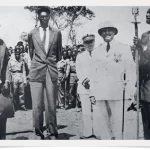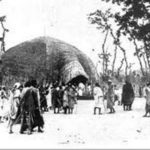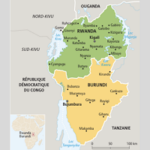The Changing Political Game
New Goals, New Rules, New Strategies
During his long retreat and flight, Ndogosa had acted to avoid relinquishing sovereignty. For him, the question of sovereignty had been more important than preserving and extending his internal power by manipulating or negotiating with the colonial overlords. Indeed, since his power was based on the Ijwi conception of legitimate authority, he stood to lose much in relinquishing sovereignty. Ndogosa had always worked in a political system where the ideal was a series of competing but independent units within the larger regional framework. Within this context, political competition between members of the royal family focused on succession or secession (a course of action that had led to the foundation of the Ijwi kingdom itself). But there did not exist the will—nor indeed the capacity—to maximize administrative powers over the population for some ulterior political purpose. As noted above, Ndogosa’s legitimacy arose from his ritual authority requiring the regular participation of many different Ijwi groups in performing the royal rituals.
Bera’s rise to power represented a major break with this pattern. For Bera, sovereignty was not at issue. He could accommodate himself to the colonial situation because he had continually worked within a larger framework defined by external parameters. From his position in the administrative hierarchy, European rule did not pose significant obstacles—in fact, the greater political resources and regional influence of the colonial administrative apparatus provided greater potential for him, after the changing of the guard at the higher levels and especially after the eclipse of the entire senior line of the Ijwi royal family. While Bera achieved his new status at the expense of Ndogosa and his sons, therefore, his accession to power did not represent the simple replacement of one descent line of the royal lineage by another within a roughly similar political context. The nature of political resources had altered dramatically, and with this transformation, the goals and techniques of the exercise of power also changed.
Legitimacy in the new system was less important than the accumulation of these new power resources. The use of these powers was directed not primarily toward other members of the elite (from formerly competing royal families or segments of a single royal family) but toward the population as a whole, to ac-quire control of their productivity and behavior. Previously, popular support had been looked on as a tool in the struggle against competing adversaries for the prestige of royalty. But during Bera’s administration there emerged among the Ijwi elite a new concept of cohesion with other members of royalty (both within the Ijwi kingdom and with royalty in other kingdoms on the mainland) who shared a common interest in maximizing leverage over the population— ostensibly to satisfy the demands and meet the goals of a colonial administration. And not incidentally, these efforts brought satisfying results also to the new elites themselves.
New Authority Patterns of Colonial Rule and Local Response
One of the resources that Bera employed in this process of administering the population was his discretion in the delegation of power. Previously there had developed two formal types of contact between court and people on Ijwi. Dele-gated authority, usually through members of the royal family, was distinct from other lines of representation between local groups and the court. The functions of the royal family were largely confined to judicial cases; representatives of local groups, on the other hand, usually had more direct influence both on the court and with the local social groups. This was particularly true in the south, where a tradition existed of more clearly defined clan identities than in the north. Such clan distinctions on Ijwi, in fact, had jelled around the presence of the royal court in the south. In the north, clan identity was not such a consistent determinant of political action, nor, with the exception of the extreme north (Kirhanga), were there leaders in the north with a strong local power base, as was true in the south. Hence Bera’s experience, both by his position within the political hierarchy and by the nature of local level political behavior in the north, was that of exercising authority derived from elsewhere.
With the expansion of Bera’s power to the whole of Ijwi, the same administrative characteristics were applied to the south. Local representatives were sup-pressed, and new authorities were named directly by Bera. Obviously, these were neither local men nor members of the royal family (except for Bera’s sons), since all claimants to legitimate royal status—that is, those who had direct links with kingship—had been exiled. These new men were Bera’s favorites, and they shared two traits: they often had had experience with Europeans, either through education in mission schools (and so were literate) or as plantation workers (or workers in other enterprises); and they were, in the eyes of the governed, outsiders. Their lines of responsibility, and the measure of their capacity to rule, were determined from above, as was true for Bera himself. This was a major break with previous patterns of authority, and the difference was most strongly felt in the south. In general, the former centers of royalty in the south held the peoples in the north in no particularly high regard, and they resented the colonial impositions all the more because they were administered by Bera’s appointees from the north—men trusted by him, perhaps, but lacking local ties.
It is instructive to follow the colonial reports on this period. During the period of Ndogosa’s flight from the Belgians, it was noted that various “acts of insubordination on the part of Mihigo [Ndogosa] and his partisans occur with increasing frequency.”In 1926, the year of exile of Ndogosa and the military occupation of the island, the reports deplore the exodus of the population “en masse” to Rwanda and Bushi, and note that those leaving were the “former sub-jects” of Ndogosa.The report for 1928, only a year after Bera assumed rule over the whole island, notes considerable opposition to the new authorities; a “band” of fifty men that had “perpetrated certain attempts against personnel and property in the south of the island” was arrested. The report continues by noting the large numbers of people from Ijwi fleeing to Rwanda and Bushi.Strong measures were taken against these population movements, which were in fact simply a continuation of earlier historical patterns; the administration was correct in noting the political nature of such emigration. This connection between administrative demands and population mobility is brought home in the report on the following year: “The military occupation continues in the south of Ijwi. A considerable improvement has occurred during the last months of the year: Activities [against the regime] have ended or diminished greatly. It is [also] true that all types of corvée have been diminished there as much as possible.”
The reports of the middle 1930s saw the population as “calm and docile.” But after the death of Bera in July 1936, there was renewed resistance against the administration when Bera’s son took power. In 1937, the people of one section of the south, an area in the eastern highlands that had suffered heavily under colonial rule, refused to pay taxes in protest against their treatment at the hands of the tax collectors. In the report for the same year, a summary of the administration over the earlier years gives a dreary picture: “In sum, the political situation produced a general malaise; tax collection was atrocious, villages were deserted at the approach of any European, and the population opposed the weight of inertia to all orders and all [colonial] authorities. «These conditions produced a remarkable response on the part of the colonial administration: “A territorial agent was sent on the spot with an escort of eighteen soldiers, in order to intimidate the natives and to ensure the return of calm among the population in the shortest possible delay.” The result was that “corvée was was reimposed, but the number of those fleeing did not diminish in the least.” Finally, the report notes that the great majority of the population desired the return of Ntambuka, the exiled son of Ndogosa.Altogether, therefore, the report represented a curious blend of insightful diagnosis and blundering prescriptive action.
After the death of Bera, his designated heir, Rutishereka, was installed as chief of Ijwi on July 8, 1936. Rutishereka did not last for even one year. In February 1937, just one month after the widespread refusal to pay taxes had been manifested in the eastern areas of south Ijwi, he was deported. The reasons given for Rutishereka’s removal were vague; he allegedly had committed a number of faults, including illegal exactions from the population. What was not officially stated (but what everyone recognized, especially the Bany’Iju) was that he had not cemented the external alliances to powerful actors that were now necessary to maintain his position.“Illegal exactions,” after all, were not uncommon; what was different in this case was the coherence of the Ijwi response and the fact that the authorities on the mainland chose to remove Rutishereka.
The forced exile of Rutishereka provided the opportunity for the return of Ntambuka. The Belgian decision to bring back Ntambuka was clearly a response to the Ijwi resistance movement, specifically to the tax revolt in the eastern areas.Concerned about the continuing“state of anarchy”on the island, and the depopulation resulting from substantial out-migration, the Belgians looked to Ntambuka to restore order.Ntambuka was therefore recalled from exile in Lubero andinstalled as chief, but with control over only the southern portion of the island. The north was placed under the control of Rubenga, another son of Bera and the younger half-brother of Rutishereka.
Ntambuka’s return to the island did bring calm. Unlike Bera, Rutishereka, or Rubenga, Ntambuka was the legitimate mwami of Ijwi, properly enthroned by the ritual specialists, and holding in his possession the ritual objects (regalia) associated with the kingship. The population knew this and recognized him as their king. Yet in part because he was indeed a king, proud like his father, and assured of a base of support among the population, he did not curry the favor of the Belgian administration and other powerful decision makers. Unlike some of his rivals, Ntambuka did not scramble to gain the approval of the Belgian officials, the Catholic missionaries, and the “Grand Chef” of the colonially defined “Buhavu Chiefdom.” He viewed himself as a sovereign in his own right, and he acted accordingly.
Ntambuka was deported from Ijwi for the second time in 1943, eventually to be exiled to Kalembelembe.It would be seventeen years before he would return again to Ijwi. Meanwhile, the position of chief of the southern part of Ijwi was filled by another son of Ndogosa, Ntambuka’s younger half-brother Muhamiriza. Muhamiriza had close ties to Rubenga in the north, where he had spent some time as a youth. He was linked by marriage ties to Kamerogosa, the son of Bahole (and grandson of Lushombo), who had succeeded to the position of chief of Buhavu in 1942. Moreover, Muhamiriza was accustomed to working with Europeans. He had attended school while in exile in Uvira, and later he had worked for the administration at the headquarters of the Territory of Kalehe. Thus Muhamiriza had alliances that permitted him to operate successfully in the broader colonial arena beyond Ijwi. He was not a mwami, however, and he never possessed the regalia of kingship. The regalia remained with Ntambuka throughout his exile. -90
https://uk.amateka.net/the-changing-political-game/https://uk.amateka.net/wp-content/uploads/2022/11/thecolon.jpghttps://uk.amateka.net/wp-content/uploads/2022/11/thecolon-150x150.jpgChanges and ColonialismSocial & cultureNew Goals, New Rules, New Strategies During his long retreat and flight, Ndogosa had acted to avoid relinquishing sovereignty. For him, the question of sovereignty had been more important than preserving and extending his internal power by manipulating or negotiating with the colonial overlords. Indeed, since his power was based...BarataBarata rpierre@ikaze.netAdministratorAMATEKA | HISTORY OF RWANDA



